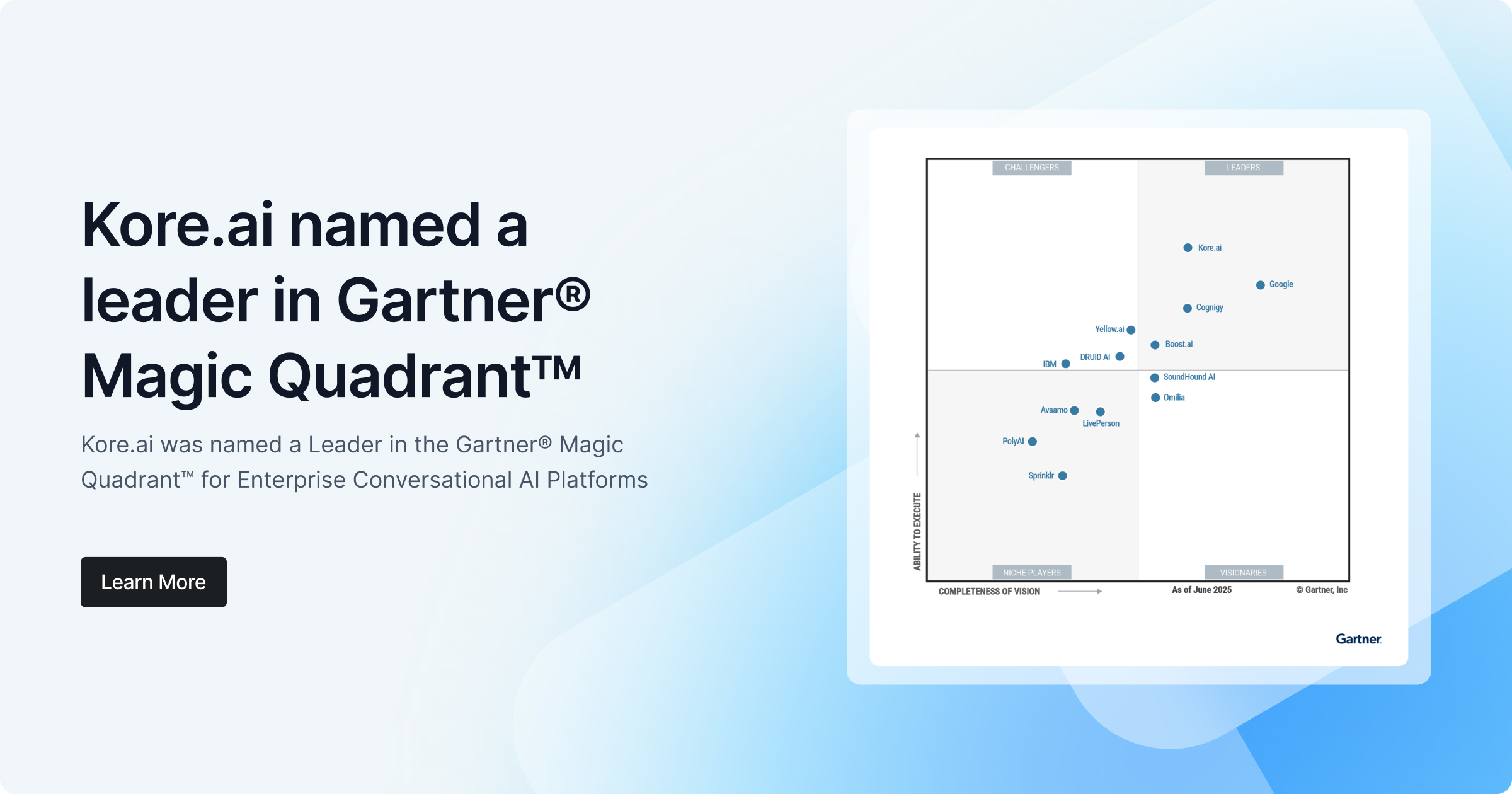Here’s how enterprises can leverage AI in retail and make the most of it.
Retailers are under growing pressure. Customers today expect seamless, personalized, and immediate shopping experiences, no matter whether they’re browsing online or walking into a store.
But traditional systems, fragmented data, and siloed operations make it difficult for enterprises to keep up. If your retail business isn’t meeting these expectations, you risk losing customers to your competitors.
That’s where AI can help you, particularly Generative AI and large language models (LLMs).
These technologies are already helping retailers enhance product discovery, streamline support, and deliver the kind of hyper-personalized engagement that modern consumers demand. In fact, the global AI in retail market is projected to grow at a CAGR of over 23.9% through 2030, signaling how rapidly enterprises are adopting these technologies to stay competitive.
In this blog, we’ll explore how LLMs and generative AI can address some of retail’s most pressing challenges, boosting operational efficiency, elevating customer experience, and helping you stay one step ahead.
Key Takeaways
- Large Language Models like ChatGPT allow retailers to deliver human-like interactions across support, sales, and service, reducing wait times, boosting satisfaction, and driving loyalty.
- From handling product queries to managing order status and returns, LLM-powered assistants can automate high-volume interactions, freeing up human agents for more complex issues.
- With Kore.ai RetailAssist, enterprises like Belcorp improved call containment by 10% in under a year, showing that conversational AI is delivering real business outcomes.
What is AI in retail?
AI in retail refers to the use of artificial intelligence technologies, such as machine learning and natural language processing (NLP), to enhance and automate various aspects of the retail value chain. From personalizing the shopping experience to optimizing backend operations, AI is helping retailers make faster, smarter decisions at scale.
Retailers are leveraging AI to understand customer behavior in real-time, offer tailored recommendations, automate routine customer service tasks, and manage inventory with greater accuracy. These capabilities not only improve customer satisfaction but also drive efficiencies in areas like demand forecasting, pricing strategy, and supply chain management.
In fact, according to Gartner, 91% of retail IT leaders are prioritizing AI as the top technology to implement by 2026, reflecting the industry’s strong commitment to leveraging AI for both customer experience and operational efficiency.
Whether it's an AI assistant guiding a customer on a website through their purchase journey or an algorithm adjusting stock levels based on sales trends, AI is enabling retailers to operate with greater agility and precision in an increasingly competitive market.
How are large language models used in retail?
LLMs in retail are trained on vast amounts of customer data, allowing retailers to better understand customer intent and generate personalized responses that feel like authentic human interaction. This enables retailers to provide a tailored and engaging customer experience, making shoppers feel like they have their own virtual shopping assistant.
From answering product questions to guiding customers through the purchasing process, LLMs are transforming the way retailers interact with their customers.
While LLMs are a powerful tool, they have some limitations, like the inability to control responses, hallucinations, and more. Therefore, combining them with conversational AI platforms can lead to even better results. These platforms can address the limitations of LLMs and create sophisticated bots that improve customer experience (CX) in a fraction of the effort and time.
By leveraging the complementary strengths of both technologies, retailers can create powerful CX solutions that engage customers and reduce operational costs. AI assistants (Chatbots) are one common approach and have been successfully implemented by companies.
For instance, Belcorp, a multinational company with 55 years in the world of beauty and direct sales, uses Intelligent Virtual Assistants to provide its customers with personalized recommendations on the website in multiple Latin American dialects. This solution has improved its customer experience with product findability, leading to a 10% increase in call containment rate in just one year of implementation.
What are the benefits of AI in retail?
AI can provide numerous benefits for retailers looking to improve their operations and stay ahead of the competition. Some of the key advantages of using AI in enterprise retail include.
1. Personalized recommendations
Retailers are leveraging natural language processing capabilities to communicate more effectively with customers and provide personalized services through AI assistants, virtual assistants, and automated customer service.
By analyzing a customer's purchase history, browsing behavior, and other data points, AI can generate recommendations for products that are tailored to the customer's interests and preferences, leading to increased sales and customer satisfaction.
According to Mordor Intelligence, AI-powered personalization is a top driver of retail adoption, with omnichannel AI for personalization contributing an estimated +8.2% impact on retail industry CAGR.
For instance, one of the world's largest consumer electronics and home appliance brands is using an intelligent virtual assistant built on the Kore.ai Platform to help its online shoppers with the necessary product information and support to increase online sales revenue.
2. Streamlined operations and reduced costs
LLMs can help automate routine tasks, such as inventory management and order processing, freeing up staff to focus on more important tasks. This can lead to increased efficiency and cost savings for the retailer, especially when supported by AI for work automation tools that reduce manual effort across departments.
According to Accenture, 50% of all working hours across retail have the potential to be impacted by AI, automating tasks like inventory management and order processing.
3. Improved customer satisfaction
How does AI improve customer support Services? LLMs can analyze customer data to provide personalized recommendations and improve the overall shopping experience. This can help increase customer loyalty and satisfaction.
4. Insights into customer behavior
LLMs can analyze large volumes of customer data to identify trends and patterns, such as popular products and shopping habits. This can help retailers make data-driven decisions and tailor their offerings to better meet customer needs.
5. Enhanced content creation and SEO
LLMs can generate high-quality product descriptions and other content to make products more appealing to customers. Additionally, LLMs can analyze search data to help improve SEO and drive more traffic to the retailer's website.
What are the Use Cases of ChatGPT in Retail?
ChatGPT is playing an increasingly important role in the retail sector, especially when integrated into an AI agent platform that allows retailers to scale. It enables retailers to provide personalized product recommendations, provide effective customer support, generate product descriptions, categorize and label products, and more. Let’s look at some of the ChatGPT use cases in retail:
1. Personalized Product Recommendations
With its ability to understand and respond in natural language, ChatGPT can help retailers deliver shopping experiences tailored to each customer. Using ChatGPT, AI assistants can be created that can provide personalized product recommendations in a natural, human-like manner based on a customer's purchase history, interests, and previous interactions with the store.
What sets ChatGPT apart is that its learning capabilities allow it to improve its understanding of customer preferences and behavior continuously. This means that it can make more informed and relevant recommendations over time, increasing customer satisfaction and a sense of loyalty to the brand.
For shoppers, that means no more generic product recommendations or frustrating checkout experiences, but a smoother, more satisfying shopping experience. For retailers, it is a perfect tool to create an engaging, efficient, and personalized shopping experience that will keep their customers coming back for more!
2. Customer Support
By using ChatGPT for customer support, especially when combined with an AI for customer service automation solution, retailers can improve the speed and accuracy of resolution while also demonstrating to customers that they care about their concerns. Here are a few ways how AI improves customer support services in the retail industry:
Quick and accurate responses
With ChatGPT, retailers can provide fast and accurate answers to common customer complaints. This can reduce wait times for resolution and improve the overall customer experience.
Automated processes
ChatGPT can be used to automate the process of receiving, tracking, and resolving customer complaints. Retailers can use ChatGPT to triage complaints based on priority, route them to the appropriate team member, and track progress until resolution.
Personalized responses
ChatGPT can be trained to understand the context of a customer complaint and provide personalized responses. This shows the customer that the retailer cares about their concerns and improves the overall customer experience.
Data analysis
Retailers can use ChatGPT to analyze complaint data to identify patterns and trends. This can help them understand the root cause of customer complaints and take proactive steps to address them.
Continuous improvement
ChatGPT can continuously learn from customer complaints and make suggestions for improvement. Retailers can use these suggestions to refine their complaint resolution processes, resulting in an improved customer experience over time.
3. Marketing content creation
In the retail industry, marketing content like product descriptions and advertising copy plays a crucial role in attracting customers and selling products. However, writing great product descriptions and advertising copy can be time-consuming, especially for retail businesses with a large product catalog.
For instance, a global electronic home appliances company is using GenAI-powered AI agents to create marketing and sales collaterals, update product webpage content, and product manuals 5X faster than it used to.
To generate marketing copies for retail, all you need to do is provide ChatGPT with some basic information about the product, like its features, dimensions, target audience, and brand voice. ChatGPT uses its advanced language processing algorithms to generate a complete description, written in a style and tone that appeals to the target audience.
And if you need to make any changes or tweaks, no problem! The generated description can be refined to your liking. Plus, ChatGPT can even analyze customer feedback and sales data to make recommendations for optimizing your product descriptions, helping you to increase sales.
4. Product categorization and labeling
Imagine a shopper unable to find what they're looking for on your online store because the products are all jumbled up. As a retailer, it can be a real headache trying to make sure all the products are in the right categories and have the right labels.
With ChatGPT, you can resolve this problem so that you don’t have to spend countless hours categorizing products and creating labels manually.
With its advanced language generation capabilities, ChatGPT can be trained to automatically categorize products based on their attributes, such as color, size, material, and more. This can be done by analyzing product descriptions and images and using the information to accurately place products into the correct categories.
This not only saves time for retailers but also ensures that products are consistently and accurately categorized, which makes it easier for customers to find what they're looking for.
Further, ChatGPT can also be used to generate product labels and tags, which provide customers with additional information about the product, such as its features, benefits, and usage. With ChatGPT, retailers can automatically generate product labels based on product data, such as product specifications and customer reviews. This ensures that the labels are consistent, accurate, and up-to-date, making it easier for customers to make informed purchasing decisions.
Conclusion
AI for Retail is paving the way for a more personalized and seamless shopping experience. When you think about how AI improves shopping experiences, retailers can offer more targeted recommendations and exceptional customer service, increasing customer satisfaction and loyalty.
In addition to ChatGPT, conversational AI solutions like Kore.ai Retail Assist are also enabling retailers to provide a personalized and seamless shopping experience by unifying online and in-store shopping. As conversational AI technology continues to evolve and improve, we can only imagine the exciting possibilities for the retail industry. The future of shopping is here, and conversational AI powers it!
Want to learn more about how AI improves retail? Let’s get in touch
FAQs
1. What is the importance of large language models in retail?
Large Language Models (LLMs) such as ChatGPT are transforming the future of AI-powered retail experiences. Their ability to understand and generate natural language allows retailers to offer hyper-personalized customer engagement at scale. LLMs help decode customer intent, automate complex interactions, and deliver human-like retail AI assistant (chatbot) conversations, making them a critical tool for brands aiming to stay competitive in the digital retail space.
2. What are the benefits of AI in retail?
The key benefits of implementing AI in enterprise retail operations include:
- Delivering personalized shopping experiences using AI
- Reducing customer service workloads with AI-powered virtual agents
- Enhancing predictive analytics for demand forecasting
- Automating routine processes to increase retail operational efficiency
- Improving decision-making through real-time data insights in retail
3. What are the examples of AI in retail?
Some common examples of AI use cases in retail and e-commerce include:
- AI assistants and virtual assistants for 24/7 customer support.
- Personalized product recommendations based on customer preferences and behavior.
- AI-driven dynamic pricing and promotional optimization.
- Automated inventory management and replenishment.
- Visual search and smart checkout solutions in both physical and online stores.
4. How can ChatGPT improve customer experience in retail?
ChatGPT improves customer experience by offering natural, conversational support that feels personal and intuitive. It can handle product queries, provide real-time recommendations, assist with checkout, and resolve service issues, all without human intervention. Over time, it learns from customer interactions to deliver even more relevant and accurate responses, increasing satisfaction and loyalty.
5. How can AI improve retail operations?
AI enhances retail business operations by automating routine tasks, optimizing backend processes, and improving decision-making. Solutions designed for AI for retail process automation can help forecast demand, adjust inventory in real time, streamline supply chain logistics end-to-end, and even assist staff with internal queries and training. The result is a more agile, cost-effective, and responsive retail operation.











